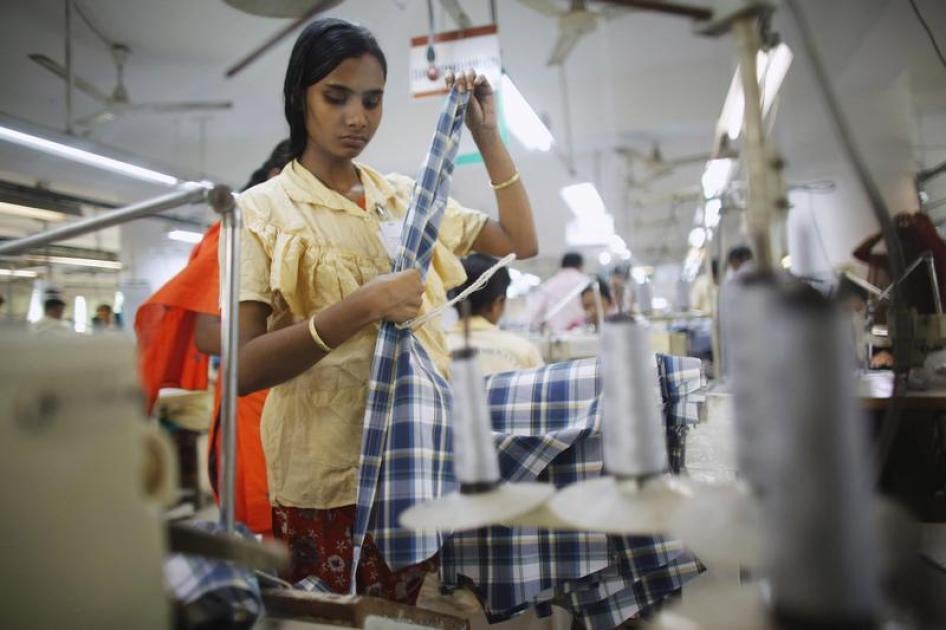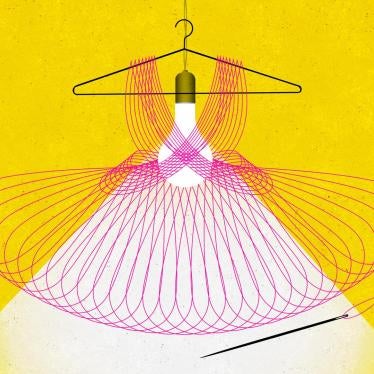Apparel companies involved in a widely hailed effort to protect garment workers in Bangladesh factories from harm need to take another step to make sure the gains are sustainable. Making that happen depends in large part on workers' ability to organise and to call out dangerous conditions without fear of being beaten or fired, says Aruna Kashyap, senior counsel for the women's rights division of Human Rights Watch.
Global apparel brands were pressed to address worked safety in Bangladesh factories after the Rana Plaza building collapse in 2013, which killed more than 1,100 garment workers. Activists emerged from the ruins with clothes that had brands' tags, showing the world that workers producing for those brands often toiled in factories that were crumbling or firetraps. Worldwide protests followed demanding action by clothing companies to prevent the deaths of more workers in Bangladesh.
Three weeks after the collapse, more than 200 apparel brands signed the Bangladesh Accord on Fire and Building Safety. The legally binding agreement, which will expire in 2018, was a crucial breakthrough for worker safety. It established a credible system of inspecting factories and developing corrective measures to address fire and building safety concerns. The Accord also built in strong transparency, listing all signatories, supplier factories, and publicly reporting inspection outcomes, corrective actions, and progress over time.
The Accord has helped make many factories safer, but much remains to be done. A March 2017 progress report shows that 77% of the safety hazards identified in initial inspections were reported or verified as having been fixed, but most factories still have substantial additional work to do to be completely safe.
The Accord's training programme on workplace safety has covered 482 factories, educating about 1m workers.
Empowering workers
But there's more to worker safety and rights than just inspections and training. To ensure that the gains are sustainable, even after the Accord is phased out and handed over to the Bangladesh government, it's crucial to empower workers to protect themselves even after inspectors and trainers leave.
The parties to the Accord are negotiating an extension. The Accord should continue its inspections and training, but also move to the next vital step: enabling workers to report unsafe factories by protecting their right to freedom of association. Independent unions can play an important role as whistleblowers for dangerous factory conditions, and act to protect workers from harm.
No one should forget that some of the workers in Rana Plaza factories saw the cracks in the walls. They didn't want to enter the building that morning but some factory managers threatened them with dismissal if they refused. There were no unions in any of those factories.
Unions can help workers stand up to unjust demands that put their safety and rights at risk. A single worker may be afraid to come forward. But together, in a union, workers can feel confident to raise their voices. In a recent example, in April, unions in two factories in Bangladesh's Ananta Building intervened and ensured that workers were not forced to enter a building they feared was unsafe.
But most Bangladesh factory owners are hostile to unions, viewing them as pesky rabble-rousers tarnishing the factory's reputation. Many factories have retaliated against union organisers with brute force. Human Rights Watch research uncovered instances of workers being beaten by thugs believed to have been hired by factory managers. To this day, most garment workers in Bangladesh risk being fired or threatened if they dare to form unions.
Recently, I met a woman garment worker who tried to form a union in Bangladesh. She said male factory managers called her into their office, pinned her down by the neck on a desk, gripped her hand, and forced her to sign a blank sheet of paper. Then they fired her. But they fixed the paper to say she had "resigned." It was the workers' fourth unsuccessful attempt to unionize.
A union leader from another factory bravely persisted despite threats from the production manager: "The company has a lot of money. If they want to have you abducted, they can and you will vanish. We'll have your hands and legs broken—we can do it inside the factory." Workers from other factories had similar stories—some union leaders were attacked and seriously injured for trying to form a union.
Freedom of association
Bangladesh government authorities have a longstanding crackdown against unions, and the labour laws don't sufficiently protect workers who try to organise. If brands in the Accord want to make Bangladesh's factories safe, they cannot ignore unions' value for ensuring worker health and safety.
The Accord stakeholders should revise its public reporting and complaints mechanisms to include addressing limits on freedom of association. The Accord should include freedom of association as part of corrective action plans linked to fire and building safety and expand its existing complaints system to include grievances related to employer interference with unions.
Without this, the Accord will fall short of delivering true empowerment and protection for workers. More important, it will miss a vital opportunity to make sure that when the Accord expires, workers will be better equipped to raise their voices.
About the author: Aruna Kashyap is senior counsel for the women's rights division of Human Rights Watch, a US-founded international non-governmental organisation that conducts research and advocacy on human rights.









